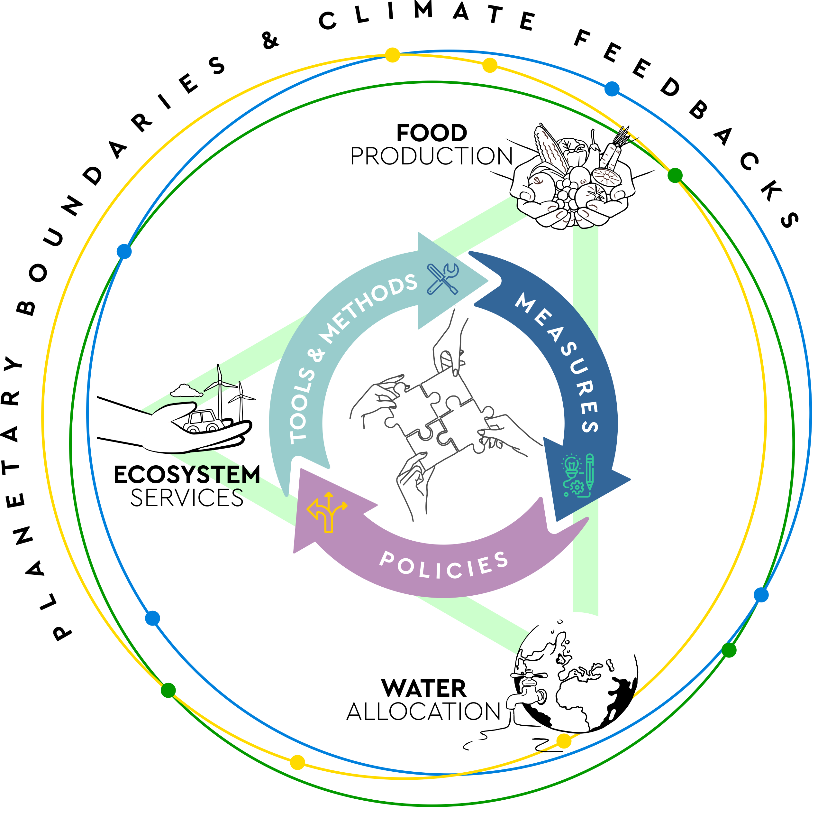Understanding of the Nexus interactions between Water, Energy, Food and Climate
- Nature Governance
- European Commission
- ItalySloveniaSpainGreeceRomaniaBulgariaSerbiaColombia
- 2021 - 2024
- rexusproject.squarespace.com

REXUS (Managing REsilient neXUs Systems through Participatory Systems Dynamics Modelling) is an innovative and experimental project that, through a multitude of approaches, aims to improve the understanding of the Nexus interactions between Water, Energy, Food and Climate (WEFC) as a framework for resource security and sustainable development.
The WEFC Nexus has emerged as a useful concept to describe and address the complex and interrelated nature of our global resource systems, on which we depend to achieve different social, economic and environmental goals.
By engaging a broad range of stakeholders, REXUS will co-develop and co-validate knowledge and tools that facilitate the transition from the stage of “Understanding the Nexus” to “Nexus Doing” in order to strengthen resilience.
The problem
Freshwater, energy and food are essential for human well-being and sustainable development, but projections suggest that their demand will be on the rise due to, amongst other factors, demographic changes, economic development, urbanisation and climate change.
As water becomes scarce and competition between the energy and agricultural sectors grows, there is still a lack of reliable and policy-relevant data and information to guide water allocation choices.
The strong linkages between water, climate, energy, food and ecosystems are at the root of the challenges addressed in REXUS. They are rarely understood and even less incorporated in the relevant policies at national and regional levels to translate into Nexus Doing.
The project
Nexus interactions are complex and dynamic, and sectoral issues cannot be looked at in isolation from one another.
REXUS will provide a wealth of practical tools, solutions, and roadmaps that support stakeholders (from local communities to countries) in the process of incorporating Nexus into their day-to-day routine activities and strategic decisions.
The project aims to support the transition from ‘Nexus Thinking’ to ‘Resilient Nexus Doing’ by following a four-step process:
- Building an evidence-base of data (from multiple sources), models, and scenarios
- Using these to enhance Nexus Understanding and Nexus Thinking and develop solutions
- Practical implementation of solutions in 5 pilot cases that cover a wide range of climatic, environmental and socio-economic conditions, as well as diverse governance structures
- Snowball effect from pilot communities, leading to Nexus Doing becoming mainstream.
Our contribution
Our team will be involved in several cross-cutting activities of this project, such as:
- Supporting project partners in the assessment and the quantification of Ecosystem Services related to water, food, energy in the pilot areas.
- Providing the methodological and practical foundations for the selection of Nature Based Solutions (NBS) to be implemented in the pilot areas to secure a climate resilient nexus. More in details, Etifor will be involved in the review of existing NBS frameworks, the identification of relevant sets of NBS appropriate to the issues and the scales of the pilot areas and the creation of a NBS integrated decision support framework.
- Supporting the overall implementation of REXUS solutions in the pilot areas in Italy/Slovenia, Spain, Greece, Romania/Bulgaria/Serbia, Colombia.
- Supporting the stakeholder engagement process and piloting activities within the Italian-Slovenian transboundary Isonzo Basin, in partnership with the Basin Water Board (Autorità distrettuale delle Alpi Orientali).
The REXUS (Managing REsilient neXUs Systems through Participatory Systems Dynamics Modelling) project is funded by the European Union’s Horizon 2020 programme.



